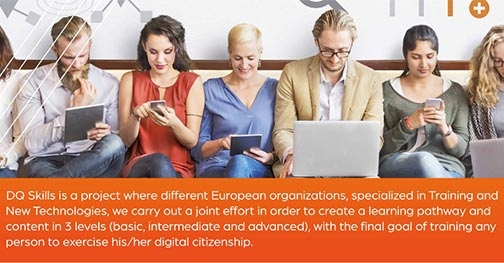In the last decades we have seen a transformation of our reality, each day more and more influenced and linked to the digital world. No one doubts that we are experiencing a profound change that, supported by new technologies in a massive way, offers us great opportunities and challenges.
We could say that mobile devices and the internet have been the two key elements that - as the printing appearance caused, or later other mass media, such as radio or television - reaches absolutely all the spheres of our lives: communication, information, entertainment, commerce, the provision of education, health and government services, and the production systems themselves. These elements not only provide new tools, but also influence our position in the world, in our role as citizens.
Thus, although the concept of "digital citizen" was initially created to define those people who were active on the Internet and who used it to interact with their public administrations or collaborate with social and political entities, this idea become obsolete, and it is now clear that digital citizenship is no longer a matter of choice, but there is a digital space in which all citizens must be present.
Some specialists are already talking about Digital Intelligence, which would be the "set of social, emotional and cognitive skills that allow individuals to face challenges and adapt to the demands of digital life”.
DQ SKILLS is a Erasmus+ funded project, seeking to deepen into the citizenship approach of this definition. As the Coalition for Digital Skills and Job Coalition recently pointed out, one of the most pressing priorities that stands out at the EU level is the need to develop Digital Competences for all, that is "to develop the digital skills to ensure that all citizens are active in our digital society. "
The development of these competences also contributes to combat digital exclusion, which is emerging as a widespread and growing phenomenon in the European Union. According to data from the Digital Scoreboard, 80 million of Europeans have never used the internet, and the latest data published by the European Commission on the Index of Economy and Digital Society (2017) a 44% of Europeans do not have basic digital skills.
The European Digital Citizens' Competences Framework (2016) added that older people, less educated young people, and low-income and migrant families are often the most troublesome. But in addition, 32% of the EU workforce lacks sufficient digital skills, and 13% believe that it has none. Across the EU, 42% of citizens without IT skills are inactive in the labour market.
DQ SKILLS project aims to contribute to the provision of competences of digital citizenship in adults, understood as “the ability to use digital technology and media in safe, responsible and effective ways”. For doing it partners are working on the design and development of 2 main products:
- A training itinerary for adults in digital citizenship, based on the DIGCOMP and the competency breakdown that it proposes, to create a training itinerary allowing students to progress through the 3 levels (from basic to advanced).
- A training course aimed at adults who want to improve their skills to exercise active and effective digital citizenship.
The use of the DIGCOMP framework as a reference facilitates the evaluation and subsequent accreditation of these competences in any European country, to the extent that the implementation of this structure generalizes in the different Member States.
Project partners include Media Creativa (Spain), Drosostalida (Greece), Fundatia Centrul Educational Spektrum (Romania) and Fundacja “Malopolska Izba Samorzadowa (Poland).
DQ SKILLS project is funded with the support of the ERASMUS+ Programme (2017-1-ES01-KA204-038504)
More information at:
https://www.instagram.com/dqskillsproject
